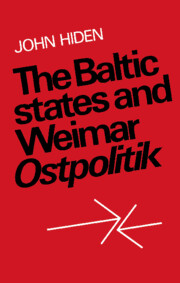Crossref Citations
This Book has been
cited by the following publications. This list is generated based on data provided by Crossref.
Hiden, John
1987.
Germany, Home and Away.
The Historical Journal,
Vol. 30,
Issue. 2,
p.
463.
Clemens, Walter C.
1991.
Baltic Independence and Russian Empire.
p.
46.
Feuchtwanger, E. J.
1993.
From Weimar to Hitler.
p.
1.
Rowell, S. C.
1994.
No longer all at sea? English Baltic studies.
The Historical Journal,
Vol. 37,
Issue. 3,
p.
675.
Hartman, Gary
1997.
Dollars, diplomacy, and dignity: United States economic involvement in Lithuania, 1914–1940.
Journal of Baltic Studies,
Vol. 28,
Issue. 2,
p.
153.
Smith, David J.
1999.
Retracing Estonia's Russians: Mikhail Kurchinskii and Interwar Cultural Autonomy.
Nationalities Papers,
Vol. 27,
Issue. 3,
p.
455.
Kasekamp, Andres
2000.
The Radical Right in Interwar Estonia.
p.
4.
Sundbäck, Esa
2002.
The Baltic states, Finland, and British economic expectations in the early 1920s.
Journal of Baltic Studies,
Vol. 33,
Issue. 3,
p.
307.
Purs, Aldis
2002.
The price of free lunches: Making the frontier Latvian in the interwar years.
Global Review of Ethnopolitics,
Vol. 1,
Issue. 4,
p.
60.
Alenius, Kari
2004.
Under the conflicting pressures of the ideals of the era and the burdens of history: Ethnic relations in Estonia, 1918–1925.
Journal of Baltic Studies,
Vol. 35,
Issue. 1,
p.
32.
Feest, David
2017.
Spaces of ‘national indifference’ in biographical research on citizens of the Baltic republics 1918–1940.
Journal of Baltic Studies,
Vol. 48,
Issue. 1,
p.
55.
Norkus, Zenonas
Morkevičius, Vaidas
and
Markevičiūtė, Jurgita
2021.
From warfare to welfare states? Social and military spending in the Baltic States 1918–1940.
Scandinavian Economic History Review,
Vol. 69,
Issue. 1,
p.
1.
Ziemer, Klaus
2021.
The Emergence of New States in Eastern Europe after World War I: The German Impact.
TalTech Journal of European Studies,
Vol. 11,
Issue. 1,
p.
93.
Medijainen, Eero
2024.
The first step in Estonian-US diplomatic relations: the case of Ants Piip.
Journal of Baltic Studies,
p.
1.





